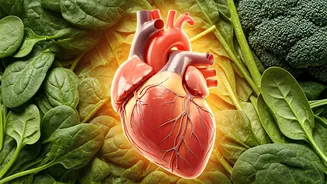Bone Health Champion
Vitamin K is a fat-soluble vitamin that is essential for blood clotting and plays a significant part in bone metabolism. Its primary function is to activate
proteins involved in bone formation, like osteocalcin. Osteocalcin binds calcium, making bones stronger and denser, therefore reducing the risk of fractures and osteoporosis, particularly as you age. Research indicates that adequate Vitamin K intake is linked with improved bone mineral density and a reduced risk of fractures. Including Vitamin K-rich foods in your diet, such as leafy green vegetables, can significantly enhance bone health. People who consume enough Vitamin K may experience a noticeable improvement in their bone density, which is critical for maintaining an active and independent lifestyle. Consuming a diet that includes Vitamin K-rich foods can lead to improved overall bone health.
Heart-Healthy Benefits
Besides its benefits for bones, Vitamin K also plays a key role in heart health. Vitamin K helps to prevent the buildup of calcium in the arteries, which can lead to plaque formation and increase the risk of heart disease. The vitamin activates a protein called matrix Gla protein (MGP), which inhibits calcium deposits in the arteries. This action helps to keep arteries flexible and prevents them from becoming stiff. Studies show that people with higher intakes of Vitamin K have a lower risk of cardiovascular disease. The inclusion of Vitamin K in the diet contributes to the maintenance of a healthy heart and overall cardiovascular function. Adequate levels of Vitamin K can support the arterial system.
Sources and Absorption
There are two main forms of Vitamin K: Vitamin K1 (phylloquinone) and Vitamin K2 (menaquinone). Vitamin K1 is primarily found in green leafy vegetables such as spinach, kale, and broccoli. Vitamin K2 is found in fermented foods, such as natto (a Japanese fermented soybean dish), and in small amounts in animal products like meat, eggs, and dairy. The absorption of Vitamin K is best when consumed with dietary fats. The presence of fats in the diet enhances the uptake of this fat-soluble vitamin. Supplementing with Vitamin K can also be an effective strategy, especially for those who may not be meeting their dietary needs through food. Consider the inclusion of foods that contain healthy fats to help ensure optimal absorption of the Vitamin K present in your meals.
Dietary Recommendations
Daily requirements for Vitamin K vary depending on age and sex, but it is generally recommended to consume enough through your diet. Adults typically need around 90-120 micrograms of Vitamin K per day. The best way to meet these needs is by including a variety of Vitamin K-rich foods in your daily meals. For instance, a serving of cooked kale or spinach can easily provide more than the recommended daily allowance of Vitamin K. Ensuring adequate intake of Vitamin K involves being mindful of your diet and making informed choices about the foods you consume. Consider integrating Vitamin K-rich foods into your daily meals to support overall health and well-being. Consulting a healthcare professional can give you customized advice on your dietary needs.
Beyond Colds
While Vitamin C is often highlighted for its role in supporting the immune system, Vitamin K provides important benefits that are often overlooked. It contributes to bone and heart health. Vitamin K's importance extends beyond what many people think. By ensuring that proteins involved in bone formation are activated, Vitamin K promotes strong, healthy bones. Similarly, in the cardiovascular system, this vitamin is essential in preventing artery plaque formation. Including Vitamin K rich foods, such as leafy green vegetables, into the diet can help enhance these crucial aspects of health. The dietary inclusion of Vitamin K is a simple yet powerful means to support overall health. Vitamin K, though frequently underestimated, is a vital element for both skeletal and cardiovascular health.














